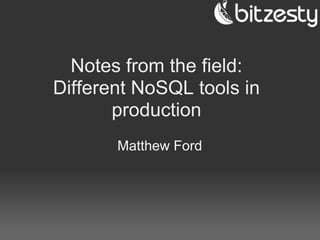NoSQLEU: Different NoSQL tools in Production
- 1. Notes from the field: Different NoSQL tools in production Matthew Ford
- 2. We've used: Key Value Stores: Document Stores: Redis MongoDB Tokyo Cabinet CouchDB
- 3. Redis Project: Gnip Filter Requirements: Users can filter realtime data streams by keywords. Solution: redis.set_add('ipad', 'client_id') In the background we filter the data stream, when a keyword matches, we push that piece of data to all the client ids. redis.set_members('ipad')
- 4. Redis Benefits: Drawbacks: Fast Not fault tolerant Simple model No replication Sets are useful Whole data set in memory O(1) for set add/remove
- 5. Tokyo Cabinet Project: tweetarium Requirement: Store tweets from a user to build up twitter lists Solution: Serialized JSON from the twitter API, and arrays of twitter ids for the lists. Running on a small slicehost slice (poor mans memcached) Live at http://tweetarium.com/
- 7. Tokyo Cabinet Benefits: Drawbacks: Still Fast Documentation mostly in Japanese Persistent Kyoto Cabinet (successor) Space efficient
- 8. CouchDB Project: Project management app Requirements: Everything needed to have version tracking (snapshots of the entire project and all of it's associations). Solution: Hybrid system, removed version control from SQL and pass a JSON representation of the project data to CouchDB.
- 9. CouchDB Benefits: Drawbacks: Flexible Library support (at the time) Simplify architecture JS Views, with changing schema Robust HTTP not a fast as binary protocol
- 10. MongoDB Project: feesability Problem: Case estimation and planning tool, with the need to 'clone cases'. Solution: All cases data is embedded within the case document (with some references to other documents). This enables us to easily clone an entire case.
- 11. MongoDB Benefits: Drawbacks: Flexible Replication not here yet Fast Libraries are playing catch up Ad-Hoc queries Durability Trade-off Easy to query embedded documents
- 12. Conclusion Use the right tools for the job
- 13. Thanks! More info http://blog.bitzesty.com General NoSQL news http://nosql.mypopescu.com/













